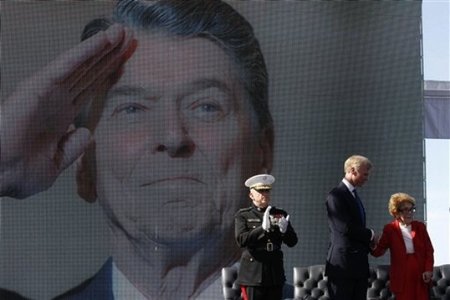At the CPAC gathering of conservatives and libertarians this week in Washington, DC, will any of the potential 2012 candidates mention Egypt at all? It will be interesting if they do, and frightening if they do not.

One of the most fascinating interviews I've ever seen Brian Lamb conduct - and there are many on C-SPAN's Booknotes - was with Kiron Skinner concerning her book, Reagan in His Own Hand. The entire interview is here, and it's well worth your time to watch it. Skinner, whose expertise as an academic is on the history of the Cold War, famously discovered an incredible archive of material written in Reagan's own hand of more than a thousand radio broadcasts, mostly delivered from 1975 to 1979, which were broadcas all around the country. Reagan would give brief three minute overviews and anecdotes, many of them very specific, with some real insight on world affairs, domestic policy and more.
Skinner's book led to a massive reconsideration of Reagan as a historical thinker when it was released - she describes him as a one man think tank, and the comparison seems apt. Yet this is not to suggest Reagan was right about everything - Skinner highlights mistakes that he made or inconsistencies with later policies, particularly toward the engagement of dictators in Africa and elsewhere.
Yet as you step back and take a measure of this time, what's intriguing about these broadcasts is that together they depict a candidate who uses his time in the wilderness - post governorship, rejected by his party in 1976, before the 1980 election and the change it brought - to better himself not just in learning about the country but also in learning about foreign policy, and in sharing what he learned with a rapt audience in unedited fashion.
The vast majority of these radio addresses focus on the world as a whole. Reagan talks not just about Communism but also about defense and intelligence policy, outreach to the Third World, treaties, diplomacy and human rights issues. He does a series on the B-52 bomber and Salt II, and hints at the policy that would later come to be known as the Strategic Defense Initiative in his criticism of the Carter administration's policies. He even devotes two commentaries to the intricacies of NSC-68, a report declassified in 1975 which sounded the alarm on the Soviet's military buildup to President Truman.
By 1976, Reagan had already succeeded as a sports broadcaster, actor, corporate spokesman, union leader and two-term governor. He had learned to adapt to the realities of the modern media, to dodge and parry in debate, to educate himself on key policy matters and to communicate them in winning fashion. Yet in the course of these radio broadcasts, you see Reagan clearly setting himself apart on matters of foreign policy, defense and the Cold War - casting off the Nixon/Kissinger approach and speaking with conviction of taking a different path.
(Quick aside: My favorite moment of the 1976 impromptu remarks Reagan gave after Ford was nominated is a shot of Kissinger in the audience, ignoring the speech entirely.)
There's a contrast here, of course - one you might have seen coming. The fans of the former Governor of Alaska, Sarah Palin, have made an art out of Reagan comparisons, particularly after a speech she gave last weekend at the Reagan Ranch. For my own part, by any measure other than name identification and a shared political party, this seems like so much thin ice. There is a key difference here, and nowhere do you see it more pronounced than on foreign policy. This difference has nothing to do with intelligence, in my view - it has to do with commitment and humility.











